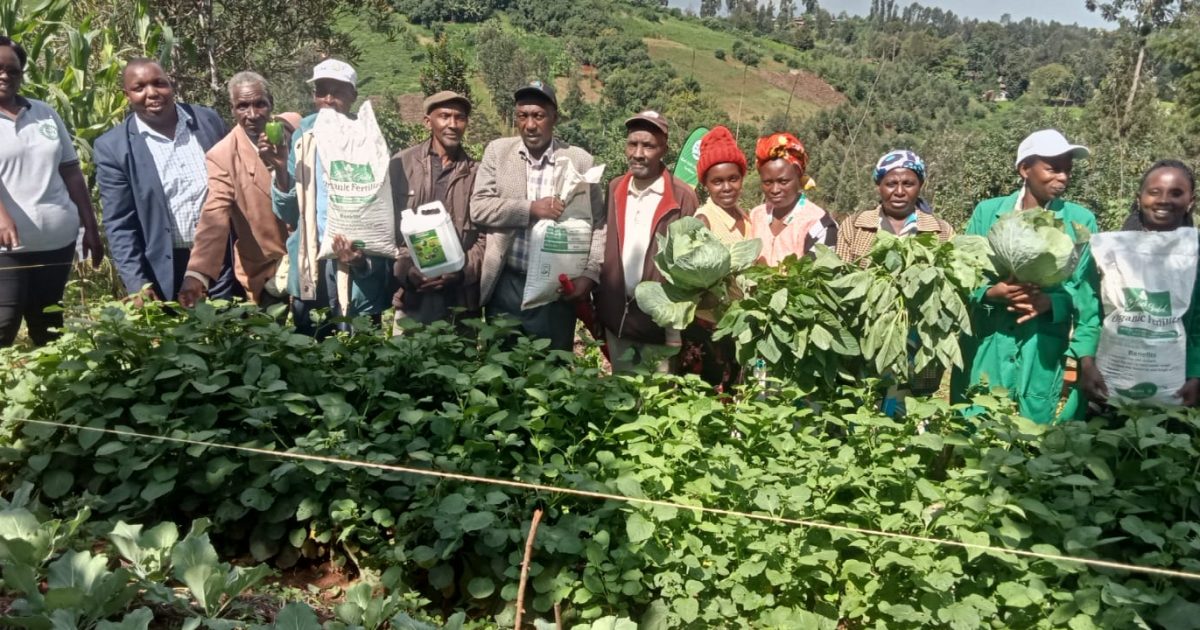Over 20,000 smallholder farmers in Murang’a County have received training on organic farming from the Organic Agriculture Centre of Kenya (OACK), based in Kangari town.
OACK Executive Director David Karanja has said the nonprofit organisation has been training local farmers on organic farming and agroecological practices since 2006 in an effort to upscale the consumption and production of organic foods through agroecology in the county.
Speaking at Gatuiku village in Gatanga sub-county during a farmer’s field day, Karanja said more than 20,000 farmers have been trained, mostly in groups, on how to produce food that enhances their health and conserves the environment while earning an income.
“With the growing consumer awareness of healthy eating and demand for organic products, our local farmers can attract higher prices for their produce, resulting in an overall financial benefit to them and the communities they live in,” said Karanja.
Karanja said the farmer’s field day was organised under the Project Enhancing Livelihood in Coffee Areas (PELCA) that is being implemented by a consortium of organisations including OACK, Youth Action for Rural Development (YARD), the International Centre of Insect Physiology and Ecology (ICIPE), Resources Oriented Development Initiatives (RODI-Kenya), and COSDEP Kenya, among others.
“Farmer’s field days are instrumental in providing an avenue where farmers can come to benchmark and learn about the best agroecological practices and technologies available to increase organic yields,” he said.
Karanja said that because synthetic chemicals are prohibited in organic farming, the result is that there will be fewer pesticide residues in food products, thereby reducing the health risks associated with exposure to such substances.
“We teach farmers how to make bio-inputs, including compost manure like bokashi, bio-pesticides, and fodder, that help to reclaim degraded soils and are friendly to the environment,” he said.
“We also train them on how they can reclaim degraded soils and help them come up with income generating activities for their livelihood improvement,” he said, adding that they are dedicated to educating them about organic farming, which entails sustainable agricultural practices.
He divulged that farmers are also encouraged to diversify their farming to give them food variety and boost their nutrition, while integrating traditional vegetables, herbs, spices, and organic crops for better health.
“Organic crops contain higher levels of nutrients compared to conventionally grown crops,” he said, adding that farmers use a variety of techniques to improve their soil and crops, including crop rotation, cover crops, green manures, composting, and biological pest control.
Karanja urged residents to continue consuming organically grown food to safeguard their health and prevent lifestyle diseases like cancer, hypertension, and many others.
“Since we started our activities in Murang’a, we have seen a lot of people who were weighed down by disease getting healthy and economically active,” he said, adding that organic farming is the healthiest way to produce food.
Lucy Mwigai, an organic farmer from Kangari and beneficiary of OACK training on organic farming and agroecological practices, said she was first trained to produce food agroecologically for her family’s consumption and well-being.
Mwigai, who is a member of the Kangari Organic Farmers Market group, made up of 25 members, said that over time, they have ventured into selling their produce commercially since the yields have been bountiful.
“The farmers sell a range of produce, including spices and herbs and indigenous vegetables like “terere”, and nightshade,” she said, adding that they also rear livestock like cows, goats, chickens, and rabbits, among others.
She said they also came to learn that organic farm produce like herbs and spices, including paprika, rosemary, and mulberry, are medicinal and controls gastric conditions, among other ailments.
She said the county government has set aside stands for organic produce in the nearby Kangari market as a way of promoting agroecological farming and supporting organic farmers.
On his part, Joseph Mwaura, an organic farmer who is also the Vice Chairman of Gatuiku Organic Group, said the group has been practicing organic farming for the past two years and they are progressing well.
“The group farms and produces beans, potatoes, vegetables, sweet potatoes, herbs, spices, and anything else that grows and matures within three months,” he said, adding that the group comprises 15 active members who now farm organically on their farms.
Mwaura said they have started selling and taking their produce to the market, but we are hoping to come up with our own grocery shop so that people can know where they can get organic produce.
Murang’a County became the first county in Kenya to adopt an agroecology policy and ACT that has helped the county lobby for organic farming among its residents.
By Anita Omwenga




